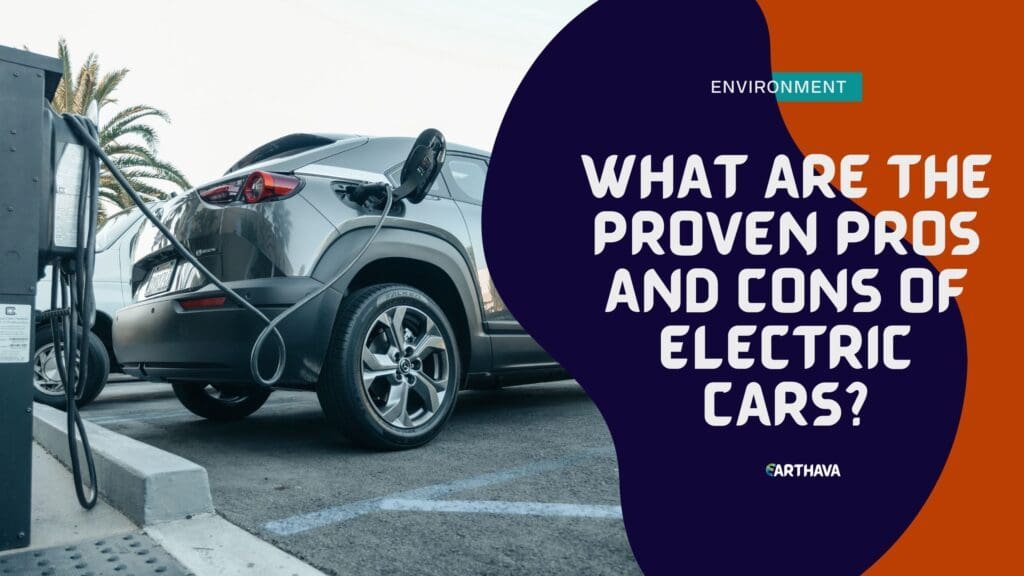Electric cars are slowly dominating roads across the globe. In fact, the International Energy Agency reported that around 3 million new electric cars were registered in 2020, which is a 41% increase from 2019. That’s not surprising as more people are looking for eco-friendly transport solutions, such as electric scooters, bicycles, and electric bicycles, to reduce their carbon footprint. However, electric cars will be a huge game-changer as they will reduce carbon emissions on roads significantly.

However, despite its environmental impact, is it worth investing in an electric car? Many electric cars such as the Nissan Leaf, Hyundai Kona EV, and Tesla Model S are showing the benefits of riding one. However, there are still many pros and cons of electric cars that car owners should know and weigh before they switch and commit to electric-powered cars.
The Pros of Electric Cars
1. Electric cars are energy-efficient
Electric cars are a good example of green technology as they not only reduce emissions but also use energy efficiently. Being energy-efficient means that a vehicle will only spend the amount of fuel source needed, thereby preventing you from wasting your fuel source. So, you can get more out of your vehicle. Compared to gas-powered vehicles, all-electric vehicles (AEVs) convert 59-62% of their energy into vehicle movement. On the other hand, gas-powered vehicles only convert 17-21% of the energy source.
2. These vehicles help reduce carbon emissions
As mentioned, electric cars emit little to no harmful gases. This makes them very eco-friendly vehicles to drive. Thanks to their rechargeable batteries, there’s no need for owners to spend on fuel as well. Aside from this, electric cars use renewable energy sources such as wind, solar, and water power. In this way, you further reduce your carbon footprint.
3. They are low-maintenance
Electric cars may be high-performance, but they are also low-maintenance. Since electric vehicles have fewer moving parts, car owners have fewer components to worry about. Because of this, it’s also more affordable to maintain an electric car. This means no more oil changes and brakes won’t wear quickly. Aside from this, some manufacturers offer better warranty and service. For example, the Hyundai Kona EV has a lifetime battery warranty and free maintenance for three years or 36,000 miles.
4. EV riders produce less noise.
Since there are fewer parts and quieter motors in electric vehicles, electric cars produce less noise, even when they speed up. For those who live in the city, this helps reduce noise pollution produced by vehicles, people, and more. If electric cars can drive side by side with electric micro mobile transportation like electric scooters and electric bikes, cities will have a much more peaceful atmosphere.
The Cons of Electric Cars
1. Electric cars are expensive
Unfortunately, electric cars cost an average of $55,600. Depending on the brand, it will cost more. For example, the Tesla S has a starting price of $79,990. This is not really affordable for most people, that’s why most consumers are not keen on buying electric cars. Moreover, replacing battery packs can be costly, so your investment doesn’t stop after paying the initial car price.
2. They offer less range than a fuel-powered car
Another disadvantage with electric cars is that they offer less range than their counterparts. Most models offer around 60-120 miles per charge, while luxury models can do 300 miles per charge. However, gas-powered cars can travel around 300 miles on a full tank of gas. Because of this, car owners are concerned about what to do if they run out of charge while traveling and they are nowhere near a charging station. If you take long trips often, this may be inconvenient for you.
3. Recharging can take a long time
Refueling a car takes minutes. However, recharging an electric car can take hours depending on how much charge you need. Unless you are at a fast-charging station, you might need to wait up to 8 hours for a full charge. Again, there’s also an issue with the available charging stations in a country. Since many car owners still use gas-powered vehicles, very few countries provide charging stations for electric car owners.
4. Owners need to install a charging station at home
Having your own charging station at home is a must if you don’t live near a charging station. This can take more time, effort, and cost into your hands. If you choose to charge your electric scooter on a standard 120-volt or 240-volt outlet, then you would have to sacrifice charging time.
Should you use electric cars?
After knowing the advantages and disadvantages of electric cars, there are definitely benefits in terms of cost and environmental impact. However, if you are interested in buying an electric car, consider the cons of owning one as well, and see if you can live with it. Overall, electric cars are a good car option, and they may be the future of transportation.
If you can’t commit to a fully electric car, then a hybrid vehicle is also a great option. Plug-in hybrid electric vehicles (PHEVs) also have similar benefits to fully electric cars. Since it uses less fuel, you still save on costs and help reduce emissions on the road. You also don’t have to worry about running out of battery since you can continue to run using the fuel.
Ultimately, if you can keep up with the demands of a fully electric car, then get an electric car. Otherwise, PHEVs are your best option.
